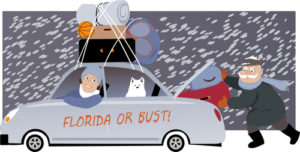 By Kristin Zacharchuk, Master Tax Professional, H&R Block Canada
By Kristin Zacharchuk, Master Tax Professional, H&R Block Canada
Special to the Financial Independence Hub
Each year, more than half a million Canadians escape the cold and travel to the U.S. sun-belt to wait out the winter, while the rest of us suffer. Must be nice!
One thing they need to remember while soaking up the sun and sipping on daiquiris, is that snowbird season is also tax season and escaping our Canadian weather, unfortunately does not allow you to forget about taxes.
The reality is, snowbirds are under a lot of pressure to understand their tax obligations, as initiatives are built between Canada and the U.S. to better track movement, assets and residency. Failing to do so could result in much worse than a sunburn including stiff penalties, lost benefits or even resident obligations that bring higher tax payments. Need I go on?
So, if you are planning to migrate south this winter, please keep these tips in mind:
Entry/exit initiative
It’s important that you keep a record of your trips to the U.S. since the Entry/exit initiative border tracking system allows Canada and the U.S. to monitor who crosses the border, when they do, and the length of their stay. Track and record this information in case you are asked to report it. If you don’t, you run the risk of being required to file a return as a U.S. resident or even losing certain benefits like provincial healthcare.
Resident alien status
The IRS looks at how much time you spend in the U.S. in order to figure out if you are a resident alien. Since, resident aliens are supposed to file a U.S. tax return, it’s important you find out if you meet their U.S. residency standards.
Closer connection declaration
If you are considered to be a resident alien in the U.S., then you will need to submit a Closer connection exception statement for aliens form to the IRS to avoid filing a U.S. tax return, by the U.S. filing date on April 15th.
U.S. income reporting
Canadians need to declare U.S.-based income including U.S. bank accounts whose deposits earn interest, or income made from U.S.-based rental properties or investments. If you do have U.S.-based income, you will have to file a Certificate of Foreign Status of Beneficial Owner for United States Tax Withholding and Reporting (Form W-8BEN) to the IRS. Thanks to the Canada-U.S. Tax Treaty, this form prevents you from having to pay 30% U.S. tax on your earnings.
Happy travelling!
 Kristin Zacharchuk is a Master Tax Professional with H&R Block. She joined in January, 2000 and was promoted to Master Tax Professional in 2006. Kristin deals almost exclusively with US citizens/Green Card holders that do not live in the US, individuals who live in Canada, but receive income from outside of Canada, and many other residency situations. Kristin continues to support the field co-teaching many of the classes and acts as one of H&R Block’s national spokespeople. She provides commentary on tax law changes and regulatory developments, all put into simple, easy to understand, language.
Kristin Zacharchuk is a Master Tax Professional with H&R Block. She joined in January, 2000 and was promoted to Master Tax Professional in 2006. Kristin deals almost exclusively with US citizens/Green Card holders that do not live in the US, individuals who live in Canada, but receive income from outside of Canada, and many other residency situations. Kristin continues to support the field co-teaching many of the classes and acts as one of H&R Block’s national spokespeople. She provides commentary on tax law changes and regulatory developments, all put into simple, easy to understand, language.


